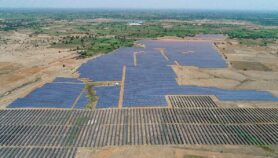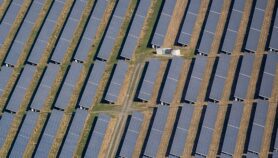By: Mihir Mathur and Swati Agarwal
Send to a friend
The details you provide on this page will not be used to send unsolicited email, and will not be sold to a 3rd party. See privacy policy.
[NEW DELHI] To meet the global low carbon growth agenda countries would need to rely heavily on natural resources, argue Swati Agarwal and Mihir Mathur.
Ahead of two major climate conferences this year on the deeply integrated issues of climate change and sustainable development under the UN Framework, discussions around technology are peaking.
The international community on climate change strongly pushes the agenda of deep de-carbonisation for the world economies in order to meet the global challenge of restricting temperature increase to two degrees Celsius. This is to be achieved primarily through the transformation of economies towards renewable energy, energy efficiency and afforestation.
Limits to technology and innovation
Technology and innovation are considered powerful drivers to meet low carbon growth in the context of climate change. As a co-benefit, sustainable development is sought to be met. However, this understanding is dealt with strong pre-assumptions.
What one loses sight, at times, is of the context of accessing resources to meet these goals within the finite world. The economic process of growth, essentially driven by growth in consumption and production, is heavily dependent on the exploitation of these finite natural resources. This means that even to meet the global climate change agenda of low carbon growth, countries would need to rely heavily on natural resources, including renewable and non-renewable such as minerals, metals, fossil fuels, land, forest and water.
This can be illustrated by taking the example of energy system transition of the world towards renewable energy. In 2014, for the first time in four decades, the global economy grew along with energy demand without an increase in global carbon emissions. The recently released Renewables 2015 Global Status Report talks about “increased penetration of renewable energy and improvements in energy efficiency.”
Materials needed for sustainable development
It is important to note that even to cope with this transition, material requirement of the world is set to multiply. For instance, the global copper consumption is poised to increase not just because electricity demand is growing but also because new energy technologies typically require more of this metal than the traditional sources. For instance, each megawatt of renewable energy on average requires 6—8 tons of copper while traditional energy sources require one-sixth of it.
If all the economies of the world were to deeply decarbonise their energy systems what will the future demand and availability of copper look like? If we were to extrapolate this to all other natural resources, both renewable and non-renewable such as minerals, energy, land, forest and water, it is imperative to question if we will safely be heading towards sustainable development.
This indicates that while the thrust towards low carbon growth can lead economies towards decoupling of their economic growth from emissions, they still will not be able to decouple growth from resource consumption. So long as the balance between economic growth and natural resource consumption is not met, even if we are able to meet the global agenda of climate change, sustainable development in the longer term will still be compromised.
Therefore, even if technology is made available, leading to quantum leaps in energy efficiency and clean energy through new discoveries, technology advancements might only be able to delay the impacts of this imbalance to a future time, but may not be able to sustain it infinitely. It is debated that the recent global economic crises and ongoing debt crises in many regions are an indication of similar systemic crises of resource depletion.
De-growth of the wealthiest
Therefore, it is imperative that a global conduct be set for de-growth of the wealthiest economies and a responsible behaviour from countries sought in this direction. Unless the pace of consumption is cut down to a sustainable level, the prospects for corralling consumption for everyone cannot be met without degrading the environment beyond its sustainable threshold levels.
Lifestyle changes are, hence, essentially the radical solution for achieving sustainable development in the long term while also meeting with the global climate change agenda because technology advancements alone can only delay the potential unforeseen impacts of the depleting resources. It is estimated that developed countries’ citizens consume an average of 16 tonnes of those four key resources per capita (going up to 40 or more tonnes per person in some developed countries).
By comparison, the average person in India today consumes four tonnes per year. Yet, India amidst its domestic challenges of alleviating poverty and meeting its energy access needs for its population — where 30 per cent is yet to receive electricity — is strongly advocating the need for changes in lifestyles to cut increases in per capita resource consumption and meet climate change goals.
Common but differentiated responsibility
As economist Kenneth Boulding stated years ago: “Anyone who believes exponential growth can go on forever in a finite world is either a madman or an economist”, is perhaps turning the tables once again towards the universally accepted agenda of common but differentiated responsibility among countries, this time to deeply cut their consumption.
Until individual country responsibility to reduce consumption is not sought, particularly from the wealthiest economies of the world, we will inevitably be heading towards more dangerous sustainable development challenges in the future. While this subject is discussed within the broader rubric of sustainable development goals, the Paris agreement on climate change within its common but differentiated responsibility agenda must also seek cooperation in this direction.
Swati Agarwal is climate policy researcher at The Energy Resources Institute (TERI) and Mihir Mathur is associate fellow at TERI. This opinion is their own.
This article has been produced by SciDev.Net's South Asia desk.














